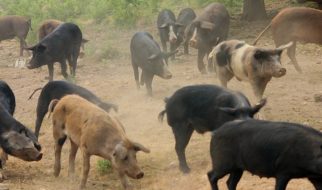When I ran across a mention of David and Mephibosheth in a book I was reading, I was drawn to look more closely at their story. I found less than three dozen verses about Mephibosheth in the Bible, mostly scattered throughout 2 Samuel with two genealogical references in 1 Chronicles. The account of David and Mephibosheth turns out to be a concise illustration of the relationship between God and mankind throughout history.

Mephibosheth was originally a member of the royal family. He was the son of Jonathan who was the son of Saul, the first king God raised up to rule Israel. Mephibosheth always had access to his grandfather, and all that Saul owned was available to him.
Our first ancestors, Adam and Eve, were God’s perfect creations placed into a perfect world. They lived in constant communion with God. All he had was theirs, and they ruled God’s earthly kingdom (Genesis 1:26-29).

Mephibosheth became an enemy of the throne. Because of Saul’s disobedience and rebellion, God rejected him as king and raised up David to sit on the throne in his place (1 Samuel 15:23; 2 Samuel 5:1-3). Mephibosheth, by his relationship to Saul, was considered to be David’s enemy.
Adam and Eve rebelled against the authority of God when they disobeyed his one command to not eat from the tree of knowledge of good and evil. They were banished from the perfect world of the Garden of Eden. Their sin separated them from God’s fellowship. They became enemies of God’s kingdom (Genesis 2:16-17; Genesis 3:1-24).

Mephibosheth deserved death. Saul and Jonathan had already been killed in battle when David became king, making Mephibosheth the next in line in Saul’s house to sit on the throne. The custom of that day was for the new king to have all male relatives of his predecessor put to death to prevent them from seeking the throne.
When sin entered the world through Adam and Eve, so did death. “The wages of sin is death” (Romans 6:23). Death is a natural consequence of sin because it separates us from God who is life. If we are separated from God, we can’t expect anything other than spiritual death.

David made the first move to show kindness to Mephibosheth. No one from Saul’s house came to David asking for anything. Certainly not Mephibosheth who was in hiding for the 15 or so years since Saul’s and Jonathan’s deaths. When the Lord gave David rest from his enemies, he remembered his friend Jonathan and inquired, “Is there anyone still left of the house of Saul to whom I can show kindness…?” (2 Samuel 9:1). He learned of Mephibosheth and sent for him.
God initiated kindness toward us. While we were still enemies of God, he sent his Son to die for us to create a way for us to reach him (Romans 5:8). And because he wants a relationship with us, he continues today to reveal himself to people who have made no move toward him.

David summoned Mephibosheth even though he was broken and unworthy. Mephibosheth was five years old when his father and grandfather were killed in battle. Fearing for his life, “his nurse picked him up and fled, but as she hurried to leave, he fell and became crippled” (2 Samuel 4:4). He was lame in both feet the rest of his life. Besides having a physical defect, he was the descendant of a king rejected by God. Despite Mephibosheth’s unworthiness, David chose to show him kindness.
We are all broken people in some way. It may be physical, mental, emotional, or relational. Our brokenness results from a fall as well, all the way back to the Garden of Eden. The entrance of sin into the world is often called “the fall of man” because, at that moment, man fell out of his relationship with God. He fell out of God’s grace. But God calls us to him regardless of what burdens we carry. Jesus said, “Come to me, all you who are weary and burdened, and I will give you rest” (Matthew 11:28).

David showed kindness to Mephibosheth for the sake of Jonathan. It was not because of Mephibosheth’s sad physical condition or any other unfortunate circumstances of his life. David’s motivation was his desire to honor Jonathan. David and Jonathan shared a deep friendship. David had promised Jonathan that he would never cut off his kindness from Jonathan’s family (1 Samuel 20:14-17).
God shows kindness to those who belong to his Son, Jesus Christ. We haven’t done anything to deserve that kindness, but God accepts us and showers us with his grace because of his Son whom he loves (Ephesians 1:6).

David restored the family estate to Mephibosheth. According to Israeli law, family land was passed down to legitimate sons. With Saul and Jonathan both dead, the inheritance from Saul would have normally gone to Mephibosheth. However, that hadn’t happened with Saul’s rejection by God.
Followers of Christ—sons and daughters—are in line for an inheritance as well. Much better than a piece of land on earth, though, it is the kingdom of God, our eternal home in heaven (Matthew 25:34).

David was the only one who could show this kindness to Mephibosheth. He was the king. The Lord had given David all the house of Saul (2 Samuel 12:8) after Saul’s son Ish-Bosheth was killed, so he possessed the land that Mephibosheth would have inherited. He had the power to do whatever he wanted with it.
After Jesus’ resurrection, he ascended into heaven to sit in his seat of authority at God’s right hand (1 Peter 3:21-22). As king, he alone can dispense all spiritual blessings because they come from the heavenly realm (Ephesians 1:3).

Mephibosheth became as one of David’s sons. In addition to restoring the family land to Mephibosheth, David told him, “You will always eat at my table” (2 Samuel 9:7). David would provide for him and treat him as he did his own sons. Once the son of a prince and grandson of a king, then driven to live in obscurity as a worthless, unclean “dead dog” (2 Samuel 9:8) when his family was rejected by God, now Mephibosheth had been accepted into the royal family.
After the fall from grace in the Garden of Eden, all mankind became “objects of wrath” because of our sin nature. “We were dead in transgressions” when Christ came looking for us and invited us to his palace. If we accept his invitation, God will seat us “in the heavenly realms in Christ Jesus” (Ephesians 2:1-6), and we will become part of his royal family. “4In love 5he predestined us to be adopted as his sons through Jesus Christ, in accordance with his pleasure and will” (Ephesians 1:4-5).

David protected Mephibosheth. When Israel suffered a lengthy famine, the Lord told David it was because Saul had killed Gibeonites, breaking a vow that the Israelites had made to them. This was a serious offense against God’s law. To make amends, David was to turn seven of Saul’s male descendants over to the Gibeonites for them to kill. Then the Lord would end the famine. David did what was required, but he honored his promise to Jonathan and spared Mephibosheth (2 Samuel 21).
When we answer God’s invitation to come and trust in him, we enter into a safe place. The psalmist says we will be “like Mount Zion, which cannot be shaken but endures forever” (Psalm 125:1). Jerusalem, the city of God, was built on Mount Zion, a solid foundation of rock. When we dwell with God, we are protected within and will not be shaken by the earthquakes of life. “He alone is my rock and my salvation; he is my fortress, I will not be shaken” (Psalm 62:6). Jerusalem was also surrounded by mountains, a picture of God’s protection for his people from the enemy without. “As the mountains surround Jerusalem, so the Lord surrounds his people both now and forevermore” (Psalm 125:2).

We are all Mephibosheths—fallen princes, enemies of God, broken and dead in our sins, deserving of death. But God, in his unfathomable kindness, sent his Son to make a way for us to be restored to him. He invites us, with all our brokenness and baggage, for the sake of his beloved Son, to dwell with him. If we accept, we will become his children, his heirs, and receive all that originally belonged to Adam and Eve—perfect communion with our Father now and forever, and unlimited access to every spiritual blessing.
Scripture quotations are from NIV.
Feature photo by rawpixel.com on Freepik
“M” rubber stamp image by hemera_technologies on FreeImages




Angie Camp
September 29, 2022Bonnie, as you know, all of the Old Covenant points to the Triune God: Father, Son, and Holy Spirit! Thank you for pursuing your curiosity, Angie
bspencer
September 29, 2022Excellent point, Angie. Thank you!
Brenda+Murphy
September 29, 2022How interesting! I love how God showed you that connection and that you could share it with us. It’s always cool to see more ways the Bible is showing us the way. It is truly “the neverending story.” 🙂
bspencer
September 29, 2022I actually first saw the connection between Mephibosheth/David and Adam and Eve in another blog. I had never thought of that before and it wowed me, so I kept looking for more connections. I love the parallels.
Thank you, Brenda.